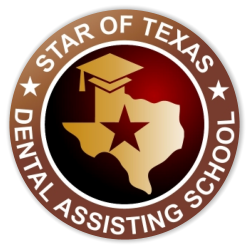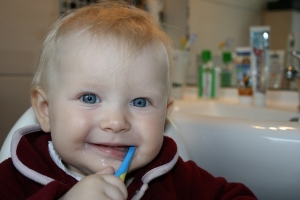A child’s first visit to the dentist should be at a much earlier age than most parents think – and for a different reason. The first dental visit should occur in infancy, as teeth are beginning to erupt. During this visit, your dentist will let you know how to care for your child’s teeth and what preventative measures you should be taking for your infant at this early stage. Many dental problems can be intercepted when we have the opportunity to examine your child and visit with you in the early developmental stages.
The first cleaning for your child (pedodontic prophylaxis) should be done at about 2 to 2.5 years of age, depending on the child’s behavior. Importantly, this should not be the first time the child visits the office. Before this visit, the child should come in with a parent who is getting a routine preventative prophylaxis. In this way, children come to know the dental office as a nonthreatening experience. Hopefully, by the time they come for their own prophylaxis, they have been to the office several times. They know the dentist, the dental hygienist, and the way the office and dental equipment looks. They will have a good idea of what will be expected of them. They will have had only good experiences with all of people at the location. Usually, children introduced to dentistry in this manner are very excited about having their own dental appointments.
It is important for parents to always talk positively about going to a dental appointment as well as after the dental appointment has occurred. Children are very smart. They may not know what some of the words mean, but they can understand how you feel about it. You should try not to use any words around them that might have an unpleasant connotation: toothache, drill, pull, hurt, pain, unhappy, etc. Always talk about how happy you are to go to the dentist and what a great experience it was. If your appointment wasn’t great, talk about it in private where children cannot overhear. If necessary, and if your child asks, tell him or her about how glad you are that the dentist is making your mouth feel good again, without mentioning any of the discomfort.
It is also important that the children are not threatened by the dentist and to avoid making the dentist appear to be the “heavy.” Don’t tell children, for example, that if they eat candy, they will have to go to the dentist to get their teeth drilled and filled. Children will then think of the dentist’s office as a place where you get punished for doing something bad. Children should be completely comfortable and shouldn’t worry when it is time for a dental appointment.
The Visit
 The first time the child has a dental procedure performed, at the age of 2 to 2.5 years, it will usually be very simple, quick, and entirely painless. Of course, that is if you have followed all of the preventative suggestions: fluoride, vitamins, if appropriate, brushing the child’s teeth, nothing in a night bottle but water, and so forth.
The first time the child has a dental procedure performed, at the age of 2 to 2.5 years, it will usually be very simple, quick, and entirely painless. Of course, that is if you have followed all of the preventative suggestions: fluoride, vitamins, if appropriate, brushing the child’s teeth, nothing in a night bottle but water, and so forth.
First, the dentist should spend a little bit of time with the child in a show-and-tell mode. They will show the child the various instruments: polishers, mirrors, “Mr. Thirsty” (saliva ejector), the water gun (air/water syringe), and so on. The dental hygienist will also begin to instruct the child in proper brushing techniques. At this young age, children do not manipulate dental floss and a brush properly. This is a project for the parent. Since children admire and try to imitate their parents, your good example of brushing and flossing each day will help tremendously in this area. Children will see that it is something you do, which they will then try to imitate.
Also during this visit, the dentist will “count” the child’s teeth, while looking for decay or other problems. Then the dental hygienist will “tickle” (clean and polish) the teeth. Stains and plaque that might have accumulated will be easily removed. It is very unusual for a child to have major periodontal problems.
If the child is prepared correctly, the first treatment visit at the dentist will be anticipated with no anxiety, proceed smoothly, and make the child excited about coming again. What you do at home in preparation for this first visit is most important to its success.
Are you interested in Pediatric Dentistry?
Sign up for Star of Texas Dental Assisting School to get trained and start your career as a Dental Assistant!


